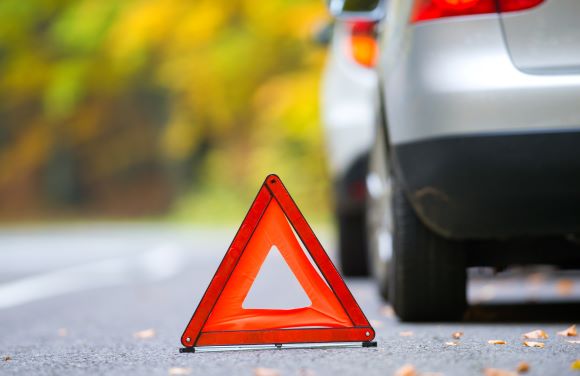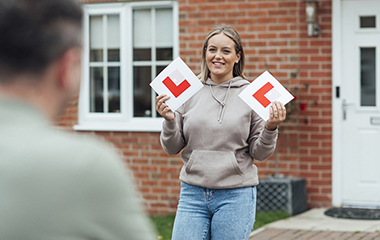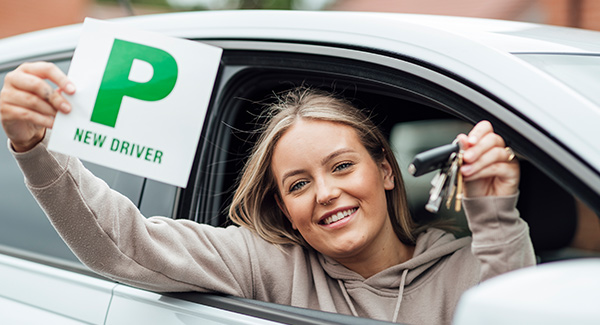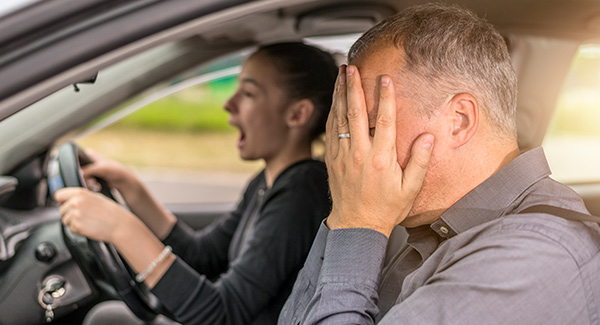Driving test nerves
- Editorial Team
It’s perfectly normal to feel nervous before your driving test. After all, passing your driving test is a life-changing experience that gives you the freedom to drive where you want and when you want. It can open new job opportunities and allow you to travel to new destinations with friends and family.
Passing your driving test is a difficult task, with around half of learner drivers failing their driving test each year. It’s not the end of the world if you don’t pass. You will have gained vital experience in taking a driving test and you’ll be better prepared for when the time comes to take your test again.
If you’re suitably prepared there’s no reason to worry or feel nervous. Your driving instructor wouldn’t put you forward for your test if they didn’t feel that you were ready. But to give yourself the best chance of passing, you need to control your nerves.
How to recognise driving nerves
Feeling nervous about a driving test is to be expected. You may feel or experience any of the following symptoms:
- Dizziness.
- Sweaty Palms.
- Perspiring.
- Shortness of breath.
- Shaking.
- An upset stomach.
- Increased heart rate.
Get plenty of sleep
Sleep is essential for our health and wellbeing, so it’s important to get a good night’s sleep the night before your driving test. Try to aim for between 7 to 8 hours of sleep if possible.
Tiredness whilst driving can affect your alertness, concentration, your ability to control your vehicle and may result in slower reaction times. It can also increase the risk of a motor accident.
As tempting as it may seem, avoid using your mobile phone before bedtime. Your phone can keep you more active and awake at night. The blue light from your phone’s screen can interfere with your sleep by suppressing the production of melatonin, which is a hormone that controls your sleep cycle.
You should also avoid caffeine and alcohol before bedtime as this can have a negative impact on your quality of sleep.
Keep it to yourself
As much as you’d like to tell everyone about your driving test, the more people you tell, the more pressure you will put yourself under to pass. Try to limit the number of people you talk to about your driving test. You don’t want to feel like you’re letting people down if you don’t pass. Keep it between family and close friends.
Avoid caffeine
You may feel that a few cups of coffee will help to settle you down on the day of your driving test, but excessive amounts of caffeine can affect your concentration and leave you feeling agitated, nervous, jittery, and restless.
Instead, keep yourself hydrated by drinking plenty of water. Remember to have a toilet break before your test though, just in case.
Talk to your instructor
If you’re feeling nervous or anxious about your driving test, talk to your driving instructor. Feeling nervous is to be expected, and your instructor will be used to dealing with students in similar situations. They can give you the reassurance you need and help guide you through the process.
Treat your driving test as just another lesson
Whilst it may seem easier said than done, try to treat your driving test as a normal driving lesson. You may feel nervous at first, but as soon as you’re out on the road, you’ll soon get into your stride and focus on the task at hand.
Remember, this is your opportunity to showcase your driving skills to the examiner and demonstrate that you can drive safely and confidentially. So, stay focused, and if you do feel the nerves kicking in, take a few deep breaths.
Listening to music
Listening to music can have a positive impact on your mood and driving behaviour. Go through your playlist and find music that will help you feel relaxed and motivated. Avoid listening to music with a fast tempo. This can get you too pumped up for your driving test and cause you to drive faster or take more risks behind the wheel.
You may even listen to music during your driving test if you feel it will help calm your nerves. Just make sure that the music is kept to a low volume, otherwise, if it is too loud, this may affect your concentration or interfere with the examiner’s instructions.
Relaxation techniques
Relaxation techniques before your driving test are a great way to control your nerves and reduce stress. You should try to set aside at least 20 to 30 minutes a day to practice these techniques. Although any time you can commit to will help.
Visualisation techniques
Visualisation techniques involve forming a mental picture in your mind that can help you relax, prepare, and improve your focus.
Visualise yourself being successful on your driving test. Focus on the specific areas of the test, such as carrying out a particular manoeuvre. Think positively about the outcomes, such as passing the test and receiving your pass certificate from the examiner.
Alternatively, find a comfortable place where you can sit or lie down with your eyes closed. Imagine yourself in a relaxing setting, such as a beach or on top of a mountain. Take a few deep breaths and picture the scene around you. Can you hear the waves? Is there a breeze? Clear your mind and try to relax.
When you open your eyes, notice how much more relaxed you feel compared to how relaxed you were before.
Breathing
If the prospect of taking your driving test is making you feel breathless, there are several breathing exercises that can reduce stress and anxiety and help you control you nerves.
Breathing exercises only take a few minutes and should form part of your everyday routine. They can be performed anywhere, either standing up or sitting down.
To control your breathing, place both feet on the ground, shoulder-width apart. Breath slowly through your nose and out through your mouth. Ensure that you breathe in gently and comfortably, without forcing it. Repeat this exercise for around 3 to 5 minutes each day.
Laughter is the best medicine
Laughter can do wonders for your state of mind and confidence. Laughter releases hormones in the body, which can help to relieve stress and create a sense of well-being.
Make light conversations with your driving instructor or take a bit of time out to watch your favourite comedy on tv.
Practice makes perfect
Practice makes perfect as they say. One of the best ways to control your nerves is by practising as much as possible so that driving becomes second nature and you become confident in all areas of your driving.
Work with your driving instructor to evaluate your driving and identify areas for improvement. So, when it’s time to take your practical test, you’ll be ready and well prepared for the challenges ahead.
Don’t put yourself under too much pressure
Try not to put yourself under too much pressure to pass your driving test. It’s not about bragging rights with your friends to see who can pass their test faster.
Remember that you are constantly learning to drive even after passing your driving test. Passing the driving test can often lead to over-confidence, which increases the risks of an accident. So, it’s not about how many attempts it takes you to pass, but how prepared you are for the challenges ahead.
Don’t be too hard on yourself if you do fail your driving test. More than half of learner drivers that take their driving test in the UK fail each year. Just because you fail, doesn’t mean that you’re a bad driver. It just means that the examiner didn’t feel that you were ready on this occasion.
Regroup, and focus on the areas that need improving, so that you can come back stronger next time.
Likewise, it’s better to pass your test before you start planning road trips with friends and family or exploring job opportunities in the city. You’ll end up putting yourself under unnecessary pressure to pass.
Be prepared
Make sure that you have all the documents that you need to take to the test, such as your provisional driving licence and your theory test pass certificate if you have it. Keep them in one place so that you’re not rushing around or panicking trying to find them on the day of the test.
It may help to visit the test centre beforehand so that you can familiarise yourself with your surroundings. This may help you to feel calmer about the driving test.
On the day of the test, ensure that you arrive at the test centre in plenty of time so that you can relax beforehand. Ideally, you should aim to arrive about 15 to 20 minutes early. But also ensure you’re not waiting too long so that you’re not worrying or overthinking things.
Having a positive mindset / Managing negative self-talk
It’s essential that you have a positive mindset going into your driving test. Many learner drivers fail their driving test, not through their ability but because their mindset wasn’t right on the day.
If you allow negative thoughts to creep in or doubt yourself, this may affect your confidence, concentration, and your commitment to your lessons.
Remember, your instructor wouldn’t put you forward for your test if they didn’t feel that you were ready. So, challenge your negativity, tell yourself you’re a good driver and stay focused on the task at hand.
Replicate the driving test conditions
A mock driving test is a run-through of the actual driving test. It is structured in a similar way so that you know what to expect on the day of your test. A mock driving test will help to ease those driving test nerves and get you in a positive mindset.
It will also allow you and your instructor to work on any areas of your driving that needs improving so that when the big day arrives, you’ll feel more confident and better prepared.
Can herbal remedies help with driving test nerves?
Although herbal remedies are legal and can help calm your nerves, driving under the influence of herbal remedies can cause drowsiness and may affect your reaction times behind the wheel. So, it is generally best to avoid using them whilst driving.
Can my driving instructor sit in and observe my driving test?
In the past, if you were feeling nervous about your driving test, you could ask your driving instructor to sit in on your driving test. But, due to coronavirus (COVID-19) pandemic and social distance rules, this is no longer possible, at least for the foreseeable future. For the latest guidance, see sit in and observe driving tests or speak to your driving instructor.
Final thoughts
Almost everyone gets nervous about their driving test. But if you’re well prepared you have no reason to feel nervous or doubt your ability. The tips in this article will help you to feel more relaxed and help you control your nerves better so that you can pass with flying colours.
See top driving test tips for more information about what happens during the practical test and how to prepare for it.
Share this article
Table of Contents
More posts

Can You Take Your Driving Test In Your Own Car | A Choice

What To Do After A Car Accident | A Choice

L Plates: What You Need To Know Before You Drive | A Choice

